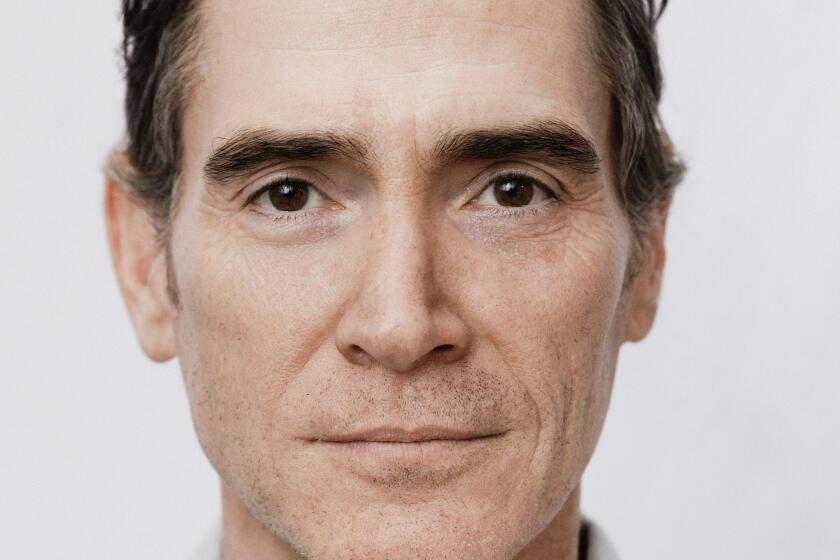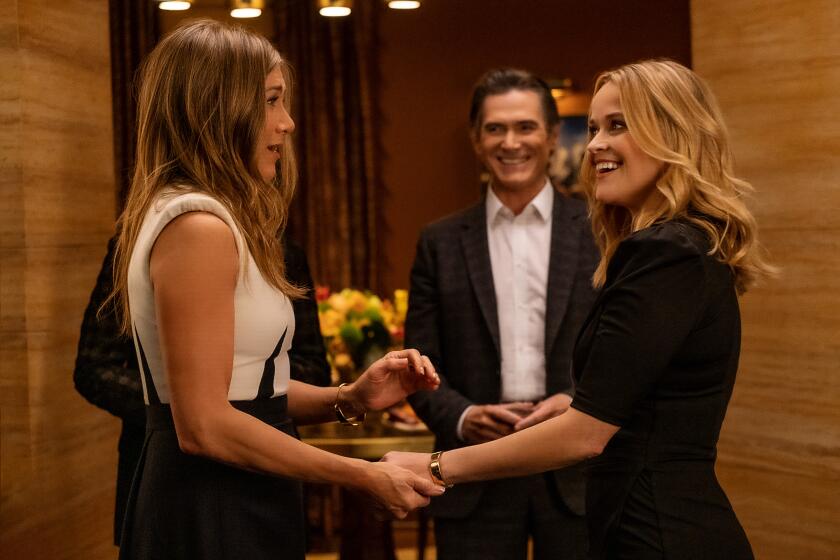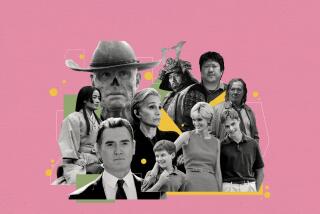
London — The third season of “The Morning Show” was undeniably ambitious in its storytelling and stakes, putting fictional network UBA’s future in jeopardy while drawing back the curtain on favorite characters. For Billy Crudup, it was a difficult journey to navigate as viewers learned more about Cory Ellison, the charmingly flawed chief executive of UBA. After playing Cory for several years, Crudup’s instinct was not to delve as deep into the character’s psychology as the writers wanted.
“They kept putting the screws to Cory and trying to illuminate some of his previous life and his previous relationships and his thinking outside of the office, which at first I felt very protective about,” Crudup says, speaking in April in London, where he was performing in the one-man West End show “Harry Clarke.” “I was like, ‘No, don’t show any of that s—.’ His whole game is that people don’t know what he’s thinking. The unpredictability of his mental gymnastics, his own certain way of managing social and corporate situations is the special sauce for him, and it’s what makes chaos so useful for him, because he’s very, very good at processing information on the fly. It’s uninteresting to me to know how that is made.”
Early in his career, a dispiriting meeting left ‘The Morning Show’ star ‘cautious’ about fame. Now he’s learning how to let down his guard.
Crudup has established Cory as one of the show’s most compelling figures. He’s a complex enigma who is perpetually thrilled by challenges and uncertain situations. But in Season 3, Cory faltered, perhaps for the first time in his life, and was left jobless by the end of the finale. Crudup has found Cory fascinating since he first met him on the page when Jennifer Aniston suggested he audition for the series after seeing him in an earlier production of “Harry Clarke.”
“His mind is exceptionally capable of holding several complicated ideas at once and finding corresponding narratives between them, and I was fascinated by that way of thinking,” Crudup recalls. “I have a friend who has a similar capacity. We went to college together. He finds the delight in it, and I think that’s where I got some of Cory’s delight in it. Like, ‘Oh, my brain just thought of this.’”
Crudup was never interested in playing Cory as a typical media executive who strives for power or success. That didn’t seem like the right foil against Aniston’s Alex Levy and Reese Witherspoon’s Bradley Jackson. He wanted to create someone against whom the protagonists could fight sincerely, ensuring the story could “meet all of its potential.”

“If he’s a buffoon or if he’s just in service of his own ego or manipulating them, it’s not terribly interesting to me,” Crudup says. “[But] he fits all of the archetypes for someone in that position of power. They let him into the club because he looks like them. He’s successful, he’s straight, he can speak that locker room talk. He uses that as a way of getting in to destabilize it.”
Still, Crudup wasn’t sure about Episode 7, “Strict Scrutiny,” in which Cory tricks Bradley into coming with him to see his mother, Martha (Lindsay Duncan), to convince her to help push through UBA’s intended merger at the Department of Justice. He performs an impromptu rendition of “Ain’t No Mountain High Enough” but ultimately finds himself shamed by his mother, leaving him questioning if he’s a bad person. It required Crudup, who did actually sing in the scene, to rework what he’d imagined about Cory’s bond with Martha.
“It didn’t exactly meet my idea of who she was or what their relationship was, what kind of caretaker he was,” Crudup says. “You have to go back retroactively and weave that in. It’s a very strange experience. It’s complicated. And especially for someone like Cory, who is already complicated and who is opaque in some ways and doesn’t share a lot of themselves.”

Cory and Harry Clarke are the two fictional people Crudup has spent the longest with in his career. He’s grateful that time has been spent with someone as intriguing as Cory, especially as an actor who describes himself as “someone who’s interested in characters.” When Aniston first approached him about “The Morning Show,” the offer was open-ended. He could have played anyone. But Crudup only wanted Cory, recalling that he said, “Yeah, I like that weirdo.” It was an uphill battle to be cast, despite Aniston advocating for him, but Crudup proved his instincts right when he won the supporting actor in a drama Emmy for the show’s first season.
“I have two brothers, so I am prone to competitive gloating, but what I actually felt was incredibly grateful,” he remembers. “I think my manager and my agent were like, ‘See, he said he could do it and he did.’ But you never know how a show is going to turn out. I’ve worked on so many things that I thought were absolutely extraordinary and nobody gave a rat’s ass. I don’t think I’ve ever been in a movie that’s made money. ‘Almost Famous’ lost money. But I have been pleasantly shocked and amused by the success and the staying power of ‘The Morning Show.’”
Whether the series’ look at our #MeToo moment works is debatable. But its combination of personal drama and topical satire is definitely fun to watch.
Crudup is currently shooting a role alongside George Clooney in Noah Baumbach’s next film before heading back to “The Morning Show” set this summer. And like the rest of us, he has no idea what the future holds for Cory. But even that is interesting.
“I think his failure will be processed in the same way he processes learning something new, with delight,” Crudup says. “He does it in the last episode with Bradley when he goes, ‘Well, I’m still the architect of the biggest failed deal of the 21st century.’ And he thinks that’s pretty cool. That energy will carry him forward and give him an opportunity to rise again.”
More to Read
From the Oscars to the Emmys.
Get the Envelope newsletter for exclusive awards season coverage, behind-the-scenes stories from the Envelope podcast and columnist Glenn Whipp’s must-read analysis.
You may occasionally receive promotional content from the Los Angeles Times.












